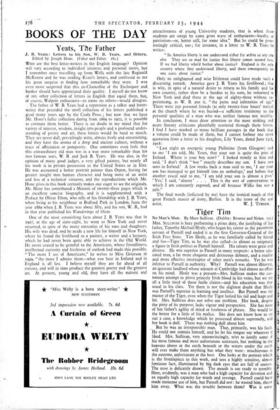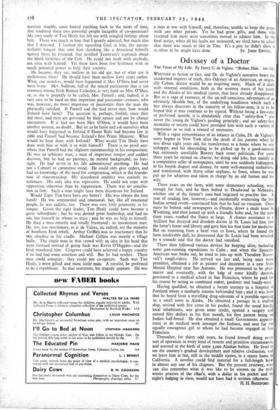Tiger Tim
No Man's Man. By Maev Sullivan. (Dublin : Browne and Nolan. 15s.) MRS. SULLIVAN is here performing a pious duty, the justifying of her father, Timothy Michael Healy, who began his career as the passionate servant of Parnell and ended it as the first Governor-General of the Irish Free State. Tim Healy, as he was familiarly called by friend and foe—Tiger Tim, as he was also called—is almost as enigmatic a figure in Irish politics as Parnell himself. His talents were great and diverse. He was superior to Parnell in many respects : a better edu- cated man, a far more eloquent and dexterous debater, and a readier and more effective interrupter of other men's remarks. Yet he was inferior to Parnell in authority. Why? Parnell was almost illiterate, an ignorant landlord whose sojourn at Cambridge had almost no effect on his mind. Healy was a peasant—Mrs. Sullivan makes the cus- tomary attempt to prove princely Irish blood in his veins, but we are all a little tired of these futile claims—and his education was that usual in his class. Yet there is not the slightest doubt that Healy was Parnell's superior in learning and intellect. But Parnell was the master of the Tiger, even when the Tiger lashed his tail and leapt and bit. Mrs. Sullivan does not solve our problem. Her book, despite the piety of its purpose, lacks vigour and perspective. She has none of her father's agility of mind or freshness of phrase. She would be the better for a little of his malice. She does not know how to set out a case, a knowledge which he possessed almost supremely, and her book is dull. There was nothing dull about him. But he was an irresponsible man. That, primarily, was his fault. He could not contain himself, and he let his tongue say whatever it liked. Mrs. Sullivan, very unconvincingly, tries to justify some of his most famous and most unfortunate sentences, but nothing in the heavens above or the earth beneath or the waters under the earth will ever make them anything but what they were: mischievous in the extreme, unfortunate at the best. One looks at the portrait which is the frontispiece to this work, and sees a highly sensitive, almost feminine face, illuminated by big dark eyes that are full of sorrow. The nose is delicately drawn. The mouth is too ready to tremble. Here, evidently, was a man who had a high capacity for devotion and an equally high capacity for wrath and revenge. Parnell could have made immense use of him, but Parnell did not : he wasted him, threw him away. What was the trouble between them? Was it some
atavistic trouble, some hatred reaching back to the mists of time, that rendered these two powerful people incapable of co-operation? My own study of Tim Healy has left me with mingled feelings about him. There was much in him that I greatly admired, but much also that I detested. I loathed the squealing Gad in him, the uncon- trollable temper that sent him shrieking like a demented fishwife against those he resented, that justified Tennyson's reproach about the blind hysterics of the Celt. He could not work with anybody, not even with himself. Yet there have been few Irishmen with so much potential power to help their country.
He became, they say, mellow in his old age, but of what use is mellowness then? He should have been mellow forty years earlier. What, one wonders, would have happened if Mrs. O'Shea had never been born? Mrs. Sullivan, full of the rancid puritanism that is too common among Irish Roman Catholics, is very hard on Mrs. O'Shea, or, as she is properly to be called, Mrs. Parnell ; and, indeed, it is very easy to be hard on that imperious and passionate creature, who was, however, no more imperious or passionate than the man she physically satisfied. If Parnell and she had never met, how would Ireland have fared? The question is, perhaps, foolish, since they did meet, and men are governed by their nature and not by chance encounters. If it had not been Mrs. O'Shea, it would have been another woman, no doubt. But let us be futile and ask ourselves what would have happened in Ireland if Home Rule had become law in 1886 and Parnell had become Ireland's first Prime Minister. What would he have done with Ireland? What would Tim Healy have done with him or with it or with himself? There is no proof any- where that Parnell had the slightest statesmanship in his composition. He was an arbitrary man, a man of imperious temper and sudden decision, but he had no patience, no mental background, no fore- sight. He had never in his life administered anything. He had not a Cabinet or committee mind. He could only give orders, and had no knowledge of the need for compromise, which is the founda- tion of statesmanship. His disordered intellect was entirely re- actionary. His only idea was repressive. He could not cope with opposition otherwise than by suppression. There was no concilia- tion in him. Such a man might have been disastrous for Ireland.
Would Tiger Tim have been any better? His was always the lone hand? He was sentimental and emotional, but, like all emotional people, he was sadistic, too. There was very little generosity in his tongue. Given the right leader, Tim Healy could have become a great subordinate ; but he was denied great leadership, and had no one but himself in whom to trust ; and he was no help to himself. He died a man entirely and totally frustrated: an incontinent man. He, too, was reactionary; as is de Valera, as, indeed, are the majority of Southern Irish rebels. Arthur Griffith was so reactionary that he was obsolete in his cradle. Michael Collins was merely a village bully. The single man in that crowd with an idea in his head that went forward instead of going back was Kevin O'Higgins—and the Irish murdered him. Cosgrave could have achieved a happy country if he had had some assertion and will. But he had neither. These men could conspire : they could not co-operate. Such was Tim Healy, a most gifted and most futile man. A royalist, he professed to be a republican. In that statement, his tragedy appears. He was
a man at war with himself, and, therefore, unable to keep the peace with any other person. Yet he had great gifts, and those who resented him most were sometimes moved to admire him. In the final assize, when all his faults are measured, we shall have to admit that there was much to like in Tim. It's a pity he didn't show it



























 Previous page
Previous page